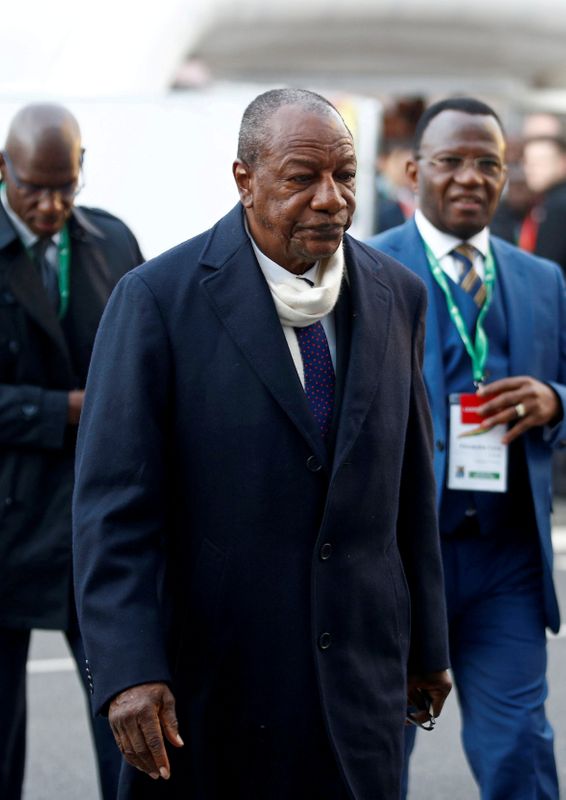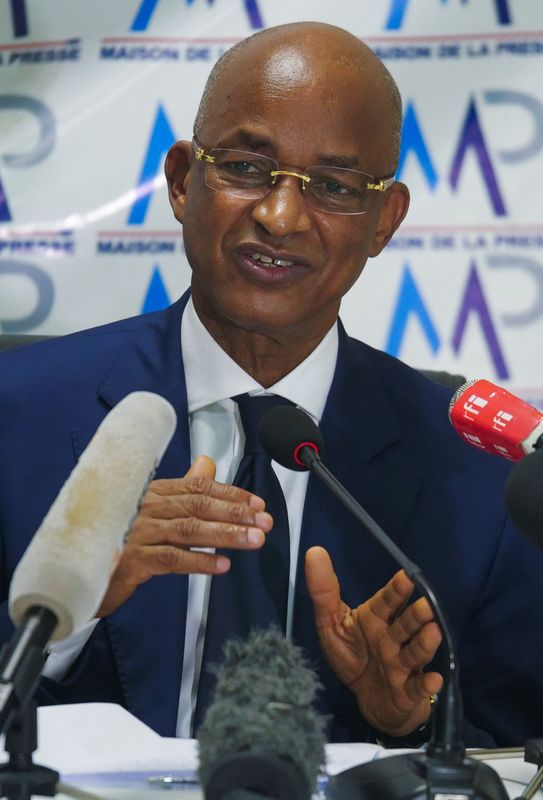CONAKRY (Reuters) – Guineans head to the polls on Sunday in a tense election in which octogenerian President Alpha Conde is seeking to extend his rule into a third term, drawing fierce criticism from opponents who say he is breaking the law by running again.
Conde became the West African country’s first democratically elected leader in 2010, bringing hope of progress after years of dictatorship and military rule.
Critics say he has carried on that authoritarian tradition with deadly crackdowns on dissent and neglect of the ordinary citizen.
Voters in a March referendum approved changes to the constitution that Conde argues reset the clock on his presidency.
The move was seen by experts as a setback for democratic progress in a region that had made strides to shrug off its image as Africa’s “coup belt.”
In neighbouring Ivory Coast, President Alassane Ouattara is also seeking a third term, raising similar concerns, while Guinea’s north-eastern neighbour Mali has witnessed a second military coup in less than a decade.
At least 30 people have been killed in clashes with security forces during protests against Conde’s bid to extend his rule.
Eleven candidates are vying to unseat the 82-year old, who says he needs another term to complete major mining and infrastructure projects.
He blames his failure to do so on the 2013-16 Ebola outbreak and recurrent opposition protests, in which around 200 people have been killed since 2010.
During his presidency, Guinea has made progress tapping its mineral riches, including by approving plans to develop the giant Simandou iron ore mine. Gross domestic product has doubled; bauxite output tripled.
However, many Guineans are frustrated that the mineral riches have not eradicated frequent power cuts and unemployment, or raised salaries.
“I do not plan to remain president for life,” he told Radio France International on Oct. 6. He declined to say whether this would be his last term if he wins.
DANGEROUS RHETORIC
His main challenger, Cellou Dalein Diallo, a former prime minister who lost to Conde in the 2010 and 2015 elections, told journalists on Monday that Conde was driven by an ambition to remain in power.
Diallo, 68, said that through the March referendum, Conde has centralised power, adding that he had also manipulated the electoral roll in his favour.
“Conditions for a fair election are not in place,” Diallo said. “Voters have not been able to check whether they are registered or not.”
Both leaders have rallied their ethnic base on the campaign trail using ethnically-tinged rhetoric that has raised concerns about post-election violence.
“The political leaders must understand that election should above all ensure peace and stability,” said Conakry resident Idrissa Camara. “Whoever wins must know that all Guineans want is better education, jobs, a better living environment, safety and a healthy environment.”
The U.N. High Commissioner for Human Rights, Michelle Bachelet, warned in a statement last week about the risk of escalating violence through hate speech.
There have been divisive appeals to ethnic affiliations during the campaign, she said, particularly references to the Malinke and Peuhl ethnicities.
“Given the history of intercommunal violence in Guinea, I am deeply worried about such dangerous rhetoric by political leaders,” Bachelet said.
Conde’s ruling Rally of the Guinean People party draws support from his Malinke ethnicity, while Diallo’s Union of Democratic Forces of Guinea enjoys strong backing from the Peuhl community. The Malinke represent about 35% of Guinea’s population and the Peuhl around 40%.
Diallo has vowed to not go quietly if there are any
irregularities in Conde’s favour.
“We will fight to win. And when we win, if he tries to steal, if he wants war, he will have it,” Diallo told supporters.
(Writing by Bate Felix; Editing by Edward McAllister and Toby Chopra)























